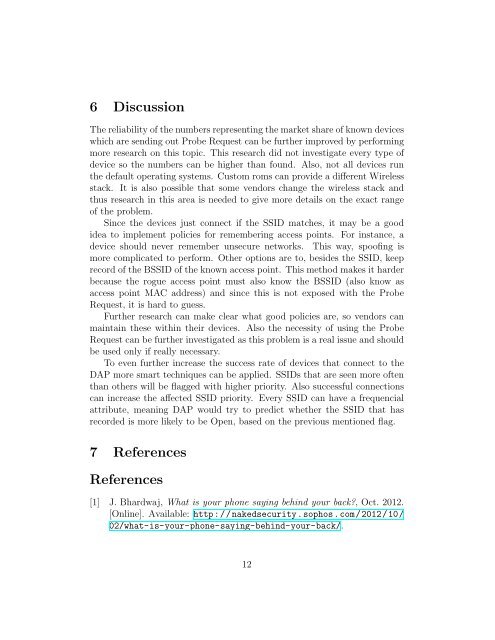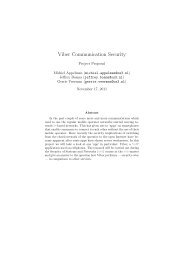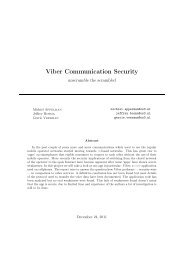Open Wifi SSID Broadcast vulnerability
Open Wifi SSID Broadcast vulnerability
Open Wifi SSID Broadcast vulnerability
Create successful ePaper yourself
Turn your PDF publications into a flip-book with our unique Google optimized e-Paper software.
6 Discussion<br />
The reliability of the numbers representing the market share of known devices<br />
which are sending out Probe Request can be further improved by performing<br />
more research on this topic. This research did not investigate every type of<br />
device so the numbers can be higher than found. Also, not all devices run<br />
the default operating systems. Custom roms can provide a different Wireless<br />
stack. It is also possible that some vendors change the wireless stack and<br />
thus research in this area is needed to give more details on the exact range<br />
of the problem.<br />
Since the devices just connect if the <strong>SSID</strong> matches, it may be a good<br />
idea to implement policies for remembering access points. For instance, a<br />
device should never remember unsecure networks. This way, spoofing is<br />
more complicated to perform. Other options are to, besides the <strong>SSID</strong>, keep<br />
record of the B<strong>SSID</strong> of the known access point. This method makes it harder<br />
because the rogue access point must also know the B<strong>SSID</strong> (also know as<br />
access point MAC address) and since this is not exposed with the Probe<br />
Request, it is hard to guess.<br />
Further research can make clear what good policies are, so vendors can<br />
maintain these within their devices. Also the necessity of using the Probe<br />
Request can be further investigated as this problem is a real issue and should<br />
be used only if really necessary.<br />
To even further increase the success rate of devices that connect to the<br />
DAP more smart techniques can be applied. <strong>SSID</strong>s that are seen more often<br />
than others will be flagged with higher priority. Also successful connections<br />
can increase the affected <strong>SSID</strong> priority. Every <strong>SSID</strong> can have a frequencial<br />
attribute, meaning DAP would try to predict whether the <strong>SSID</strong> that has<br />
recorded is more likely to be <strong>Open</strong>, based on the previous mentioned flag.<br />
7 References<br />
References<br />
[1] J. Bhardwaj, What is your phone saying behind your back?, Oct. 2012.<br />
[Online]. Available: http://nakedsecurity.sophos.com/2012/10/<br />
02/what-is-your-phone-saying-behind-your-back/.<br />
12





